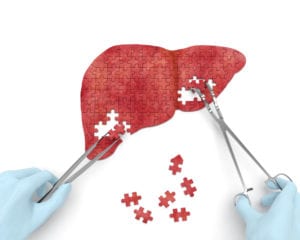Written by Joyce Smith, BS. This study suggests that daily aspirin therapy may help in the prevention of hepatitis B virus-related hepatocellular carcinoma.
 Hepatocellular carcinoma (HCC) is the second leading cause of cancer death worldwide 1. Hepatitis B virus (HBV) ranks high as the most important risk factor for HCC, and in areas where chronic hepatitis has reached epidemic proportions, there is a strong prevalence of HCC. 2 While current antiviral drugs such as nucleoside analogue therapy (NA) has been shown to prevent HBV replication, these drugs have reduced but not eliminated HCC risk. A potential therapeutic agent may be aspirin, known for its ability to tame chronic inflammation and reduce the risk for colorectal cancer 3,4; however, to date there is limited research that supports aspirin’s function as a chemo preventive agent against HCC 5.
Hepatocellular carcinoma (HCC) is the second leading cause of cancer death worldwide 1. Hepatitis B virus (HBV) ranks high as the most important risk factor for HCC, and in areas where chronic hepatitis has reached epidemic proportions, there is a strong prevalence of HCC. 2 While current antiviral drugs such as nucleoside analogue therapy (NA) has been shown to prevent HBV replication, these drugs have reduced but not eliminated HCC risk. A potential therapeutic agent may be aspirin, known for its ability to tame chronic inflammation and reduce the risk for colorectal cancer 3,4; however, to date there is limited research that supports aspirin’s function as a chemo preventive agent against HCC 5.
This long-term cohort study explored whether daily aspirin therapy was associated with risk of hepatocellular carcinoma in patients with chronic hepatitis B 6. Using 15 years of data from 204,507 chronic hepatitis B patients in Taiwan’s National Health Insurance Research Database, the research team identified 2,123 patients with no confounding conditions who had continuously received daily aspirin for 90 or more days. The daily dose of aspirin therapy for 2,079 (98.0%) patients was 100 mg/day or less (≤ 325 mg for 99.9% of patients). Based on propensity scores, participants were randomly matched in a one-to-four ratio with a control group of 8,492 patients who had never received antiplatelet therapy. Propensity scores consisted of the follow-up index date, patient baseline characteristics, and potentially chemopreventive drug use over patient follow-up. Data were analyzed from August 1 to November 30, 2018.
Of the 10,615 patients included in the analysis, 7,690 (72.4%) were men, mean age was 58.8 (standard deviation, 11.8 years). Median duration of aspirin therapy was 3.1 years. More than 80% in the treated group were taking aspirin due to cardiovascular risk factors such as diabetes, hyperlipidemia, and hypertension, followed by about 40% each for coronary artery and cerebral vascular disease.
Compared to the matched 8,492 controls who did not take aspirin, the daily aspirin therapy group of 2,123 patients significantly lowered the cumulative HCC incidence over 5 years: 5.20% (95% confidence interval 4.11-6.29) versus 7.87% (95% CI 7.15-8.60, P<0.001). For those patients who did not receive NA therapy, aspirin therapy was also independently associated with a decreased HCC risk.
After using multivariable analysis to adjust for age, male sex, liver cirrhosis, diabetes, hyperlipidemia, hypertension, statin use, metformin and/or NA use, Lee and colleagues observed that the following variables were independently associated with an increased risk for HCC: older age, male sex, and liver cirrhosis (P<0.001 for all). Correlating with reduced HCC risk were NA use (P<0.001) and statin use (P=0.01). These study results suggest that daily aspirin therapy may reduce the risk of HCC development in patients with chronic hepatitis B.
This observational study could not prove causality and may have shown biases including selection bias in spite of calculating for potential confounders. The use of a study population of predominantly middle-age or older patients eliminated generalization to younger populations. As well, aspirin therapy was discontinued by some patients during the trial, thus the accuracy of medication data may been compromised because of limited patient adherence to the prescribed therapy. Also lacking was the absence of detailed data such as HBV viral load which helps determine disease severity. Lastly, the health insurance database was limited by its reliance on insurance claims.
Source: Lee, Tang-Yu, Yao-Chun Hsu, Hsiao-Ching Tseng, Shi-Hang Yu, Jaw-Town Lin, Ming-Shiang Wu, and Chun-Ying Wu. “Association of daily aspirin therapy with risk of hepatocellular carcinoma in patients with chronic hepatitis B.” JAMA internal medicine 179, no. 5 (2019): 633-640.
© 2019 American Medical Association. All rights reserved.
Posted April 28, 2020.
Joyce Smith, BS, is a degreed laboratory technologist. She received her bachelor of arts with a major in Chemistry and a minor in Biology from the University of Saskatchewan and her internship through the University of Saskatchewan College of Medicine and the Royal University Hospital in Saskatoon, Saskatchewan. She currently resides in Bloomingdale, IL.
References:
- Torre LA, Bray F, Siegel RL, Ferlay J, Lortet-Tieulent J, Jemal A. Global cancer statistics, 2012. CA Cancer J Clin. 2015;65(2):87-108.
- El-Serag HB. Hepatocellular carcinoma. The New England journal of medicine. 2011;365(12):1118-1127.
- Thun MJ, Jacobs EJ, Patrono C. The role of aspirin in cancer prevention. Nature reviews Clinical oncology. 2012;9(5):259-267.
- Rothwell PM, Price JF, Fowkes FG, et al. Short-term effects of daily aspirin on cancer incidence, mortality, and non-vascular death: analysis of the time course of risks and benefits in 51 randomised controlled trials. Lancet. 2012;379(9826):1602-1612.
- Carrat F. Statin and aspirin for prevention of hepatocellular carcinoma: what are the levels of evidence? Clinics and research in hepatology and gastroenterology. 2014;38(1):9-11.
- Lee TY, Hsu YC, Tseng HC, et al. Association of Daily Aspirin Therapy With Risk of Hepatocellular Carcinoma in Patients With Chronic Hepatitis B. JAMA Intern Med. 2019;179(5):633-640.
